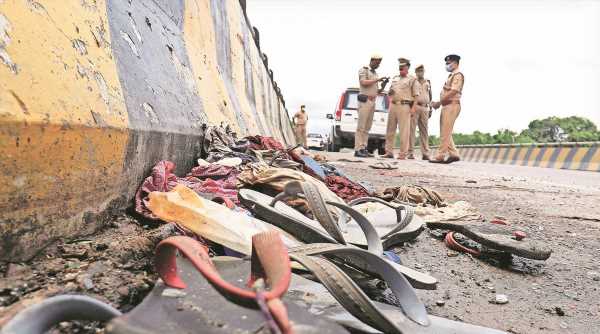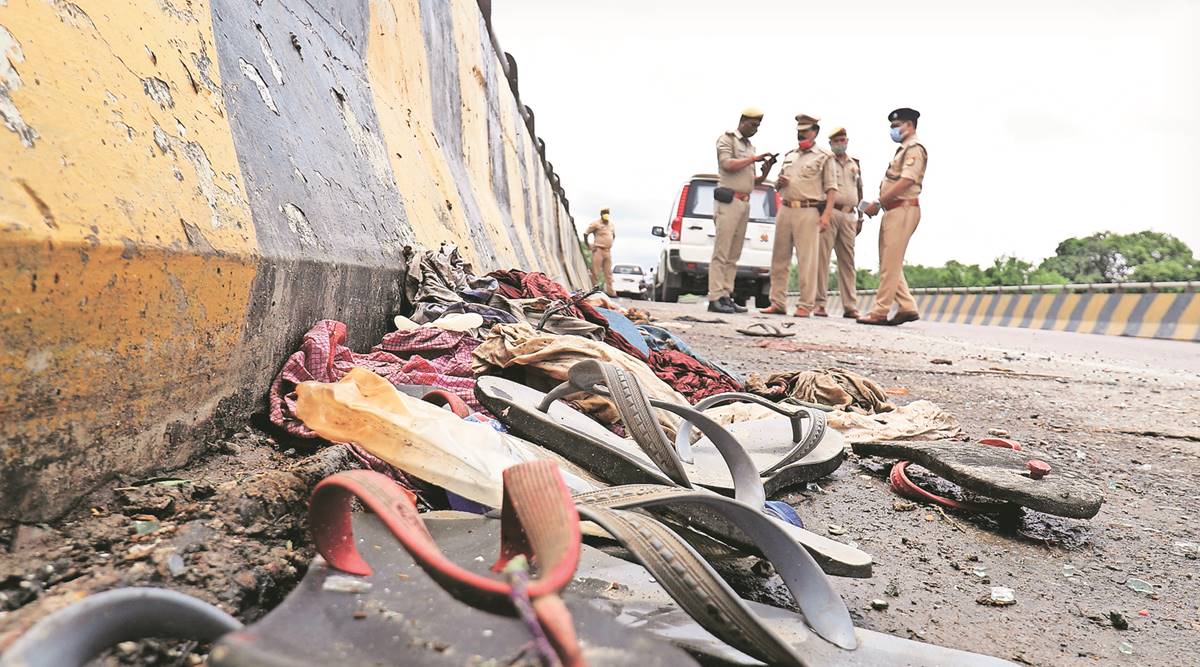People and administrative officials scrambled to ensure no one was left behind.
About three kilometres from the site of an accident in Barabanki district’s Ram Sanehi Ghat area where 18 migrant workers were killed the night before, several buses stood parked at a government school on Wednesday, ready to take survivors back home in Bihar. People and administrative officials scrambled to ensure no one was left behind.
Among those waiting to board a bus to Saharsa district were 28-year-old Subhash Sada, his wife Raviya, the couple’s two young children, and Subhash’s brother Neeraj (18). “Kal raat ka jo haal tha shayad main kabhi nahi bhool paunga [I will never be able to forget the scene from last night],” Subhash muttered.
Subhash, Raviya, and Neeraj are labourers at a construction site in Ambala in Haryana. They travel to Haryana every three months because of higher wages, and return to Bihar with their earnings. Recalling the horrific accident, the family said it survived “because of luck while several others did not”.
Subhash said they boarded the bus from Ambala. “The driver said it would cost Rs 1,400 per adult and we agreed as the bus was air-conditioned and looked good. After the bus left Ambala, there were 80-90 people on the bus. But then, somewhere near Karnal, the driver stopped the bus and asked us to get off at a restaurant and said the bus had to be cleaned. Everyone got off. But around half an hour later, the driver said some more people would board the bus, and some of us protested. But, by then we had already paid, so we had to travel. After the new set of people boarded, it became very crowded. On one berth, at least six people were seated and it was very crowded.”
As her children clinged on to her, Raviya recalled that the bus broke down in Barabanki around 8.30 pm. “The driver then tried to fix it himself, but he struggled for one hour and nothing happened. Because it was so hot, most people got off the bus and started walking around on the highway. Then later, some sat while some also lay down to rest, which is what proved to be fatal,” she said.
While Raviya was recollecting what happened, 24-year-old Seema, who was travelling in the vehicle with her husband Sanjay (26), interjected. “Those who were sitting or lying down closer to the bus were severely injured. I was sitting around 30-40 metres from the bus and that is why I am here. Others who sat closer came under the bus.” The couple are from Bihar’s Araria district, and work as construction workers in Panchkula in Haryana.
Officials said there were almost 150 people on the bus, far in excess of its capacity. Around 11.30 pm, a truck rammed into the bus from behind on the Ayodhya-Lucknow highway, sending it hurtling forward. Those who were sitting close to the bus got crushed.
Said Seema, “I saw that the bus ran over people who were sitting 10 metres from it. The scene was scary. It was dark. There were bodies and injured people everywhere on the road. Everyone was struggling to find their loved ones and some of them found dead bodies. I still shake thinking about it.”
She added, “Before the policemen came, we were trying to stop cars passing by and asking for help. None stopped, and then we had to line up bodies on the highway to get the attention of people passing by.”
Some survivors were left thinking about the what-ifs. Anil Mandal, 22, who works as a farmhand in Chandigarh, lost his uncles Balram (55) and Rajnath (40) in the accident. Sitting on a bus that will take him back home in Supaul district, he told The Indian Express that he never wanted to get on the ill-fated vehicle. But he was part of a group of nine relatives and was overruled.
“It became too crowded, and I told the people I was travelling with to not get on the bus. But when you travel with a big group, you have to listen to everyone else, and especially the elders. They [those in charge of the bus] made us sit like sheep in the bus. It was hard to breathe after the bus was stopped because the windows couldn’t be opened because of the air conditioning. I didn’t want to travel after the new set of people were made to board the bus in Karnal, but they said we would not get our money back.”
Anil said he survived because he was a bit further away from the parked bus than his uncles. He added, “Balram chacha’s son has gone to identify the bodies and take them back. I will reach earlier so I can handle the situation at home.”
Anil’s cousin and Balram’s son Sanjay (25) sat expressionless under a tree outside the district hospital mortuary, around 35 km from the district school. He will now have to travel 700 km to take home the bodies of his father and uncle.
“After the truck came and hit the parked bus, there was a loud noise. After that, it was chaos. I don’t remember much,” said Sanjay, who too works at a paddy field in Chandigarh like Anil.
He added, “If there was work in Bihar, we would have stayed there and not left. But the daily wage in Bihar is half of what we get in Haryana and Punjab — around Rs 500-600 for a day’s work. Hence, we risk everything and go so far. It is all for money and pet [stomach].”
Source: Read Full Article


